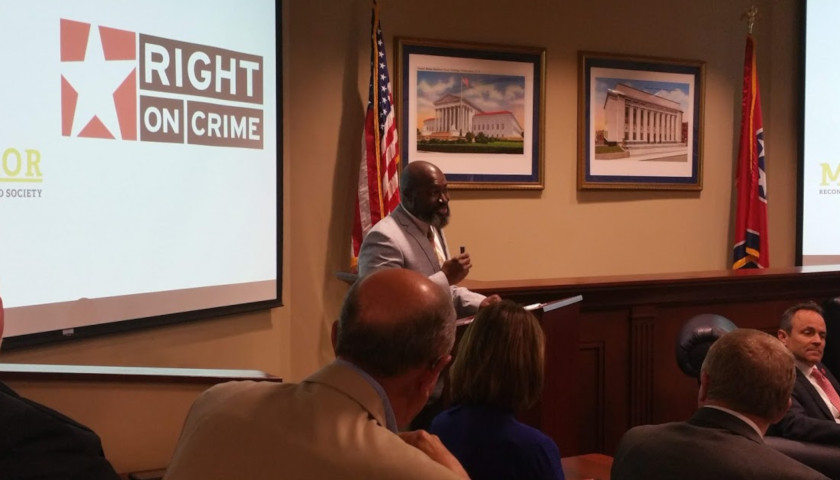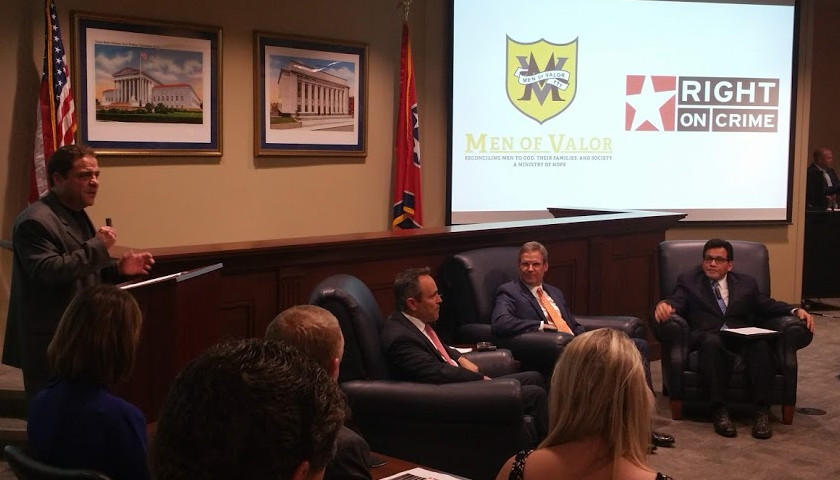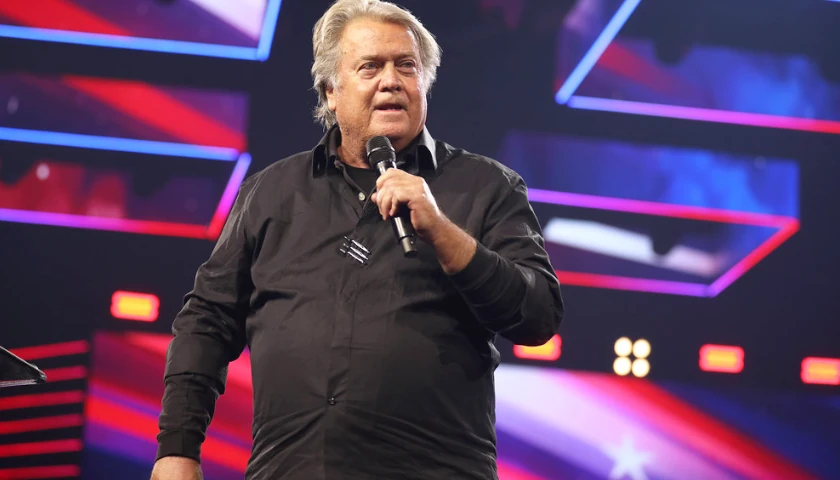NASHVILLE, Tennessee – A symposium on criminal justice reform held in Nashville featured an hour-long conversation between Governors Bill Lee of Tennessee and Matt Bevin of Kentucky.
The symposium was held in the “appellate courtroom” at the Randall and Sadie Baskin Center of the College of Law, located on the beautiful campus of Belmont University in downtown Nashville.
While the event was free, seating was limited, so advanced registration through EventBrite was required. Still, the venue ended up standing room only.

Hosts of the symposium were Men of Valor and Right on Crime.
Men of Valor offers in-prison ministry in the form of a voluntary program to participants who have applied and been selected based on having the time to complete the full six-month program and exhibiting a sincere desire to change. Programs emphasize the participants’ need for restoration with God, family, community and society, according to the organization’s website.
Additionally, Men of Valor offers aftercare and re-entry care and services to men released from prison, to help in overcoming the tremendous obstacles they face with regard to housing and even the most basic of other needs such as food, clothing, transportation, identification and employment.
Governor Lee, who spoke of criminal justice reform on the campaign trail, formed his plan as a result of his work with Men of Valor, where he sits on the Board of Directors.
Right on Crime is a project of the Texas Public Policy Foundation that, in partnership with the American Conservative Union Foundation and Prison Fellowship, offers the conservative approach to criminal justice: fighting crime, supporting victims and protecting taxpayers, according to its website.
A Right on Crime handout on the table at each seat reviewed the success in Texas, going back to 2007 when the state’s legislature faced a crisis in addressing the need for 17,000 additional prison beds at a cost of more than $2 billion by 2012.
A bipartisan group of Texas legislators, after looking at the root of the corrections growth, made a $241 million investment in treatment programs within prisons and expanded diversion options of probation and parole.
According to Right on Crime, after 10 years, Texas closed eight adult prison facilities and the state’s crime rate, with a 31 percent reduction, is the lowest it has been in decades. The three-year recidivism rate has been reduced by 25 percent.
The event was opened by Men of Valor Executive Director Raul Lopez, who introduced Nashvillian Matthew Charles. Charles was sentenced to 35 years in prison on drug-related offenses and was released in 2016 after serving 21 years and finding Christ during his time behind bars.
Once released, Charles continued his mission to turn his life around, according to Fox News, getting a job, volunteering at a food pantry and reconnecting with his family.
Two years later, however, the Department of Justice decided it was a mistake releasing Charles and sent him back to prison to complete his sentence.
The story received national attention and that’s when celebrities like Kim Kardashian West stepped in.
Meanwhile, President Trump signed the First Step Act into law on December 21, 2018, and Charles was the first prisoner to be released, as a result of the bipartisan criminal justice reform bill, aimed at giving drug offenders a second chance at life, said Fox News.
Charles attended and was recognized by President Trump during the State of the Union Address on February 5 of this year. Lopez said that Charles continues to have humility, despite the national attention he has received.
Charles said his redemption began with choosing Christ and that second chances are the whole purpose of Christ dying on the cross.
Alberto Gonzalez, a President George W. Bush appointee in 2005 as the 80th Attorney General of the United States, now Dean of Belmont’s Law School since 2014, moderated the conversation between the two neighboring Governors through a series of questions and answers in a casual setting of the three seated in overstuffed leather high-back chairs.
To the point that the criminal justice system not working the way we want it to both in terms of cost and compassion, both Governors specifically mentioned their faith as first in guiding them. Governor Bevin added that our nation was founded on second chances and Governor Lee said his faith caused him to become engaged in Men of Valor.
Lee also said that he found the men in prison are very much like him, which started the process of how he should view them. The Governor also made the point that being tough on crime without being smart on crime has had the opposite effect of reducing crime, victims and cost.
Gonzalez, mentioning that both Governors are champions of criminal justice reform, asked what role the White House or Department of Justice could play in helping them be more successful.
Governor Lee said he ran on good jobs, good schools and safe neighbors, and “when you have the favor to become Governor,” that elevates the conversation. He likened that to the President having the same effect as does what is happening in Kentucky and even the symposium.
Agreeing with Lee, Governor Bevin said he’d like to see a Second Step Act, but recognized one has to walk before running. Bevin relayed a story of being in Washington with President Trump and then Attorney General Jeff Sessions who were viewed as agnostic and even skeptical on the issue. But one person – Jared Kushner, Trump’s son-in-law – whose father was in prison helped elevate the discussion.
From the moment that the President got on board, the progress was remarkable. Governor Bevin asked rhetorically, who really loses?
To the next question from Gonzalez, when you think about success in your state, what are you concerned about, Governor Bevin said he’s not a worrier. He continued that he is concerned that they are really locking into what’s been done and not being in so much of a hurry that they get ahead of themselves.
Governor Bevin added that he has been pardoning people and not waiting until his final year, making the point that if a person is worth pardoning, why make them wait four years? With regard to pardons, Governor Bevin also said, “What a gift it is,” and added that he doesn’t know that they’re worth of the gift that only Governors and the President have, calling it a “ridiculous amount of power.”
On the issue of clemency, Governor Lee said that he’s never had to consider it in his life and called it “profound.”
The former Attorney General reflected that in the first week that Bush became Governor, they had two executions.
Governor Bevin talked about a chance encounter that lead to Kentucky participating in a data-driven analysis program called Safe Streets & Second Chances, which compares two groups coming out of prison – one with the “normal” re-entry and the other that received wrap around services. Saying it out loud seemed to prompt Bevin’s thought, “That’s a no brainer.”
Gonzalez brought up Governor Lee’s newly established task force, which Lee said will find best practices and figure out how they would translate to Tennessee. Governor Lee also talked about the additional financial investments made for criminal justice reform in this year’s budget. The task force will include all of the stakeholders – victims, three branches of government and non-profits.
Governor Bevin said something he loves about Governor Lee is that, like himself, he is a first time politician.
Being “a little ahead of you,” Bevin shared his learnings from a Criminal Justice Policy Advisory Council he formed that had a couple of dozen people, which became unwieldy. He ended up having them come up with a list, identify the top several issues and prioritize them. Then mini-panels of three to four members were established, that were more effective.
As evidence of that, Governor Bevin suggested checking Kentucky’s 2017 Senate Bill 120 (SB120), which he said is hardly perfect or comprehensive, but still amazing.
To that, Governor Lee said, “We’re going to be talking to you a lot.”
Gonzalez remarked that both Governor Lee and Bevin are Republicans who have people on the other side of the aisle and prosecutors in favor of what they are doing.
Governor Lee said that from the very beginning when he started mentioning criminal justice reform and he got a lot of head nods, he knew this was something that had to be done.
Governor Bevin thought it interesting that Gonzalez asked about the other side, responding “it confuses the heck out of them.” Bevin called it “as significant as anything that’s happened in the last two generations.” He rattled off other Republican Governors – Nathan Deal of Georgia, Rick Perry in Texas and Oklahoma’s Mary Fallon – who had similar initiatives.
Bevin added that one party talked about it, but the other did it. He finds the biggest obstacles to be in his own party, because of the historic “tough on crime” stance.
Offering the Governors a wish list of sorts, Gonzalez asked the one thing they could do to make the system fairer.
Governor Lee mentioned the complex sentencing grid in Tennessee, wanting to simplify it. He also said that criminal justice should live up to its name.
If Governor Bevin could wave a magic wand, he would make sure every judge is competent and if he could wave his wand back in the other direction it would be to give competent judges the latitude to use their judgement about what is right and just.
On the topic of concern for sentencing disparity, Bevin said somehow we already have it. He is interested in a sentencing integrity unit to go back to look at whether justice was served.
While all prisoners want a second chance, Governor Bevin said they all know who the truly innocent people are. He made the point, if a bunch of people in prison know that, then it should be looked at, adding “if I could wave my magic wand a third time.”
If you want to know everything that’s wrong with re-entry, said Governor Lee, ask someone who has had to do it.
On the subject of re-entry, something that Governor Bevin has thought about but hasn’t done is offering free public transportation for a year in the bigger cities that have transit. He asked, what does it cost, when they’re going anyway. Then, seeming to think on how that would play out, Bevin added, “There will be blow back,” it was but one of several of his comments met with laughter.
When it was time for closing comments, Gonzalez wanted to respect people’s time despite the late start , which was the result of Governor Bevin meeting with Secretary of Education Betsy DeVos earlier in the day, as Governor Lee did about two weeks prior.
As a friendly back-and-forth ensued about who would close first and with obvious mutual admiration, Governor Lee joked, “Would any of you like to talk after him?”
Governor Bevin did end up going first, expressing appreciation for having the conversation and for caring enough to come out on this beautiful day. He also said thank you for electing this man, referring to Governor Lee, and “for giving me a guy that’s going to be a joy to work within the years ahead.”
Having met two years ago when Governor Bevin agreed to meet with him for an hour, Governor Lee said that he has been such an inspiration. “It’s an incredible honor to be in this place,” said Lee, “and I realize that more and more every day.”
“Things build up in your heart,” said Governor Lee of the things he experienced and talked about on the campaign trail, and he’s excited to be able to now act on them.
– – –
Laura Baigert is a senior reporter at The Tennessee Star.





